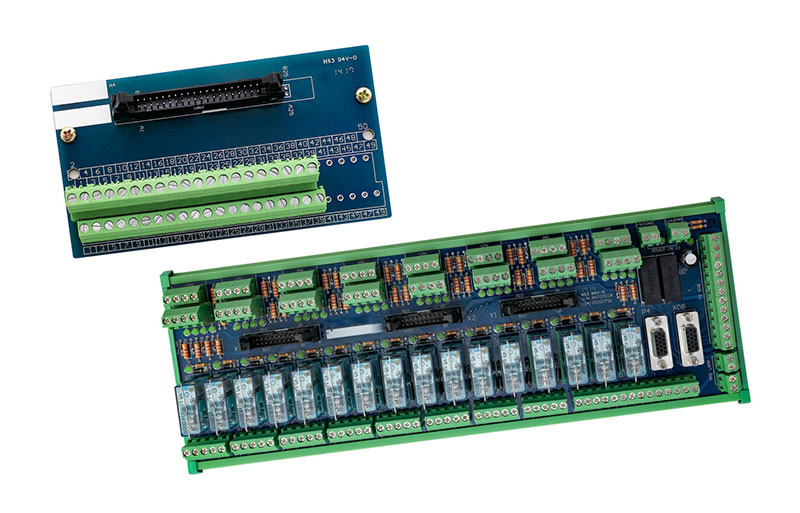- Membrane FANUC Lathe Control Operation Panel
- MITSUBISHI Milling Machine Membrane Operator Panel
- Crystal Acrylic Button Switch Lathe Operator Panel
- Acrylic Button Switch Milling and Boring Machine Operator Panel
- Laser Engraving ABS Button CNC Lathe Operator Panel
- Laser Engraving ABS Button Milling Machine Operator Panel
- Transparent Button CNC-Processing Center Operator Panel
- Transparent Button CNC Machining Center Operator Panel
- Relay Module for CNC PLC PCB
- Module Circuit Board for IO Control
- Optocoupler Insulated Circuit Board
- Interface Module Series OMRON Relay Module
- Interface Modules: Making Industrial Communication Easy
- Signal Interface Modules with LED Indicators
- Power Distribution Units for Industrial Control Systems
Applications of Customized CNC Machine Control Panels
In the realm of CNC (Computer Numerical Control) machines, operation panels play a crucial role in controlling and monitoring the machine's functions. These panels provide operators with a convenient and efficient interface to interact with the CNC machine and execute various commands. The importance of custom CNC machine operation panels cannot be overstated, as they significantly impact the productivity and ease of operation. In this article, we will delve into the practical applications of custom operation panels and explore the key factors involved in their design and creation.

Understanding the Importance of CNC Machine Operation Panels
The Role of Operation Panels in Control Systems
CNC machines rely on complex control systems to accurately translate digital instructions into precise mechanical movements. The operation panel serves as the gateway for operators to input these instructions, monitor the machine's performance, and make real-time adjustments if necessary. It acts as the control hub, allowing operators to interact with the CNC machine in a user-friendly and intuitive manner.
Enhancing Convenience and Efficiency for Operators
The design of a custom operation panel takes into account the specific needs and preferences of the operators. By tailoring the panel's layout, button placement, and functionality to the operator's workflow, it becomes a valuable tool for improving convenience and efficiency. With a well-designed operation panel, operators can execute commands swiftly, access important information at a glance, and make adjustments with ease, thereby streamlining the overall machining process.
Designing and Creating Custom Operation Panels
User Requirement Analysis and Design Principles
Before embarking on the creation of a custom operation panel, it is crucial to conduct a thorough analysis of user requirements. This involves understanding the operator's workflow, preferred control elements, and specific tasks they need to perform. By gaining insights into these aspects, designers can create a panel that aligns seamlessly with the operator's needs, ultimately enhancing their productivity and user experience.
Choosing Suitable Materials and Components
The choice of materials and components for a custom operation panel depends on various factors such as durability, functionality, and aesthetics. The panel should be constructed using high-quality materials that can withstand the harsh industrial environment while ensuring longevity. Additionally, selecting reliable components and buttons that offer tactile feedback and responsive operation is essential to maintain a high level of usability and reliability.
Interface Design and Human-Machine Interaction
The interface design of a custom operation panel should prioritize ease of use and intuitive navigation. Clear labeling, logical grouping of controls, and informative displays contribute to a user-friendly interface. Furthermore, incorporating ergonomic principles in the panel's design ensures that operators can interact with the machine comfortably and without unnecessary strain. Effective human-machine interaction promotes efficiency and reduces the likelihood of errors, ultimately optimizing the CNC machining process.
Practical Applications of Custom Operation Panels
Operation Panel Applications in Industrial Automation
Custom operation panels find extensive applications in the field of industrial automation. They are utilized in various sectors such as robotics, assembly lines, and process control systems. These panels enable operators to monitor and control multiple machines or processes simultaneously, leading to enhanced productivity, reduced downtime, and improved overall efficiency.
Examples of Customized Operation Panels in the Manufacturing Industry
The manufacturing industry heavily relies on CNC machines for precision machining and production processes. Custom operation panels designed specifically for manufacturing applications offer unique advantages. They can integrate additional features tailored to the specific needs of the industry, such as specialized control functions, data logging capabilities, or real-time performance monitoring. Such custom panels empower operators to optimize the machining process, increase output, and maintain superior quality control.
In conclusion, custom CNC machine operation panels are vital components in the control systems of modern manufacturing environments. By understanding the significance of these panels and the benefits they bring to operators, we can appreciate their role in improving productivity and efficiency. Designing and creating custom operation panels that align with user requirements, employing suitable materials and components, and ensuring effective human-machine interaction contribute to a seamless and optimized CNC machining process. Embracing custom operation panels can propel industries towards higher levels of precision, speed, and overall operational excellence.
Product Overview
- CNC Machine Operator Control Panel
- I/O Relay Module Interface Board
- CNC Handy MPG Pendant Encoder
- Digital Code Rotary Switch
- Manual Pulse Generator Engraving Handwheel
- Customized CNC PCB Circuit Board
- Industrial Computer for CNC Machine Tool
- CNC Control Cabinet OEM, electronic components processing
- Smart Industrial Control and IoT Solutions




